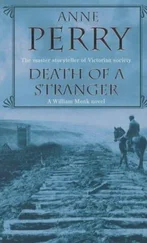Lovat-Smith faltered so minutely only an expert eye could have seen it. Then the composure returned and his expression became smooth again.
"It might keep your pocket, but it won't do your reputation any good," he said with calm certainty. "No knighthood in this sort of thing, you know."
Rathbone smiled a little more widely to hide the fact that he feared Lovat-Smith was right.
The afternoon's testimony was in many ways predictable, and yet it left Rathbone feeling dissatisfied, as he told his father later that evening when he visited him at his home in Primrose Hill.
Henry Rathbone was a tall, rather stoop-shouldered, scholarly man with gentle blue eyes masking a brilliant intellect behind a benign air and a rich, occasionally erratic and irreverent sense of humor. Oliver was more deeply fond of him than he would have admitted, even to himself. These occasional quiet dinners were oases of personal pleasure in an ambitious and extremely busy life.
On this occasion he was troubled and Henry Rathbone was immediately aware of it, although he had begun with all the usual trivial talk about the weather, the roses, and the cricket score.
They were sitting together in the evening light after an excellent supper of crusty bread, pate, and French cheese. They had finished a bottle of red wine; it was not of a particularly good year, but satisfaction lent to the tongue what the vintage did not.
"Did you make a tactical error?" Henry Rathbone asked eventually.
"What makes you ask that?" Oliver looked at him nervously.
"Your preoccupation," Henry replied. "If it had been something you had foreseen you would not still be turning it over in your mind."
"I'm not sure," Oliver confirmed. "In fact, I am not sure how I should approach this altogether."
Henry waited.
Oliver outlined the case as he knew it so far. Henry listened in silence, leaning back in his chair, his legs crossed comfortably.
"What testimony have you heard so far?" he asked when Oliver finally came to an end.
"Just factual this morning. Callandra Daviot recounted how she found the body. The police and the surgeon gave the facts of death and the time and manner, nothing new or startling. Lovat-Smith played it for all the drama and sympathy he could, but that was to be expected."
Henry nodded.
"I suppose it was this afternoon," Oliver said thoughtfully. "The first witness after luncheon was the matron of the hospital-a tense, autocratic little woman who obviously resented being called at all. She made it quite obvious she disapproved of 'ladies' nursing, and even Crimean experience won no favor in her eyes. In fact, the contrary-it challenged her dominion."
"And the jury?" Henry asked.
Oliver smiled. "Disliked her," he said succinctly. "She cast doubt on Prudence's ability. Lovat-Smith endeavored to keep her quiet on that but she still created a bad impression."
"But…" Henry prompted.
Oliver gave a sharp laugh. "But she swore that Prudence pursued Sir Herbert, asked to work with him and spent far more time with him than any other nurse. She did admit, grudgingly, that she was the best nurse and that Sir Herbert asked for her."
"All of which you surely foresaw." Henry looked at him closely. "It doesn't sound sufficient to account for your feelings now."
Oliver sat in thought. Outside the evening breeze carried the scent of late-blooming honeysuckle in through the open French windows and a flock of starlings massed against the pale sky, then swirled and settled again somewhere beyond the orchard.
"Are you afraid of losing?" Henry broke the silence. "You've lost before-and you will again, unless you prefer to take only certain cases, ones so safe they require only a conductor through the motions?"
"No, of course not!" Oliver said in deep disgust. He was not angry; the suggestion was too absurd.
"Are you afraid Sir Herbert is guilty?"
This time his answer was more considered. "No. No, I'm not It's a difficult case, no real evidence, but I believe him. I know what it is like to have a young woman mistake admiration or gratitude for a romantic devotion. One has absolutely no idea-beyond perhaps a certain vanity-I will confess to that, reluctantly. And then suddenly there she is, all heaving bosom and melting eyes, flushed cheeks-and there you are, horrified, mouth dry, brain racing, and feeling both a victim and a cad, and wondering how on earth you can escape with both honor and some kind of dignity."
Henry was smiling so openly he was on the verge of laughter.
"It's not funny!" Oliver protested.
"Yes it is-it's delicious. My dear boy, your sartorial elegance, your beautiful diction, your sheer vanity, will one day get you into terrible trouble! What is this Sir Herbert like?"
"I am not vain!"
"Yes you are-but it is a small fault compared with many. And you have redeeming features. Tell me about Sir Herbert."
"He is not sartorially elegant," Oliver said a trifle wasp-ishly. "He dresses expensively, but his taste is extremely mundane, and his figure and deportment are a trifle portly and lacking in grace. Substantial is the word I would choose."
"Which says more about your feeling for him than about the man himself," Henry observed. "Is he vain?"
"Yes. Intellectually vain. I think it very probable he did not even notice her except as an extremely efficient adjunct to his own skills. I would be very surprised if he even gave her emotions a thought. He expects admiration, and I have been led to believe he always gets it."
"But not guilty?" Henry wrinkled his brow. "What would he have to lose if she accused him of impropriety?"
"Not nearly as much as she. No one of any standing would believe her. And there is no evidence whatever except her word. His reputation is immaculate."
"Then what disturbs you? Your client is innocent and you have at least a fighting chance of clearing him."
Oliver did not answer. The light was fading a lhtle in the sky, the color deepening as the shadows spread across the grass.
"Did you behave badly?"
"Yes. I don't know what else I could have done-but yes, I feel it was badly."
"What did you do?"
"I tore Barrymore to shreds-her father," Oliver answered quietly. "An honest, decent man devastated by grief for a daughter he adored, and I did everything I could to make him believe she was a daydreamer who fantasized about her abilities and then lied about them to others. I tried to show that she was not the heroine she seemed, but an unhappy woman who had failed in her dreams and created for herself an imaginary world where she was cleverer, braver, and more skilled than she was in truth." He drew in a deep breath. "I could see in his face I even made him doubt her. God, I loathed doing that! I don't think I have ever done anything for which I felt grubbier."
"Is it true?" Henry's voice was gentle.
"I don't know. It could be," Oliver said furiously. "That isn't the point! I put dirty, irreverent fingers over the man's dreams! I dragged out the most precious thing he had, held it up to the public, then smeared it all over with doubt and ugliness. I could feel the crowd hating me-and the jury- but not as much as I loathed myself." He laughed abruptly. "I think only Monk equaled the hold of me as I was leaving and I thought he was going to strike me. He was white with rage. Looking at his eyes, I was frightened of him." He gave a shaky laugh as the shame of that moment on the Old Bailey steps came back to him, the frustration and the self-disgust. "I think if he could have got away with it, he might have killed me for what I did to Barrymore-and to Prudence's memory." He stopped, aching for some word of denial, of comfort.
Henry looked at him with bright, sad eyes. There was love in his face, the desire to protect, but not to excuse.
Читать дальше












